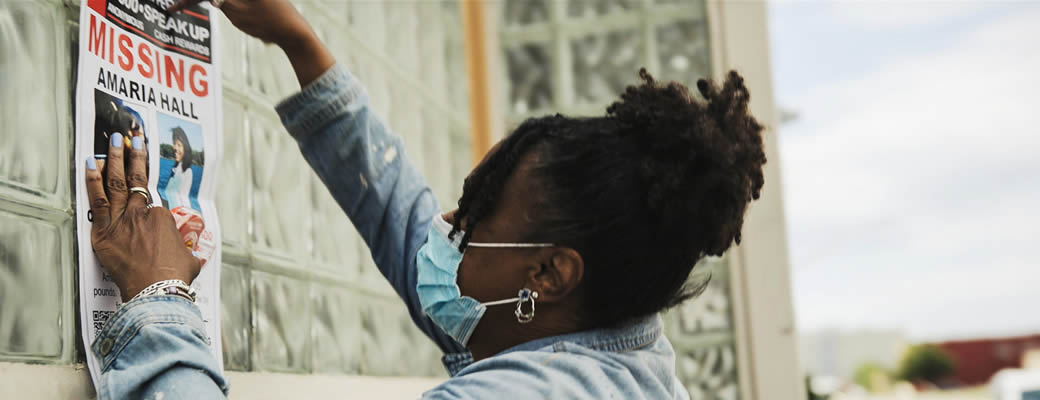HBO’s ‘Black and Missing’ would be depressing if it weren’t also so empowering
MSNBC
Patrice Peck
November 27, 2021
HBO’s new documentary “Black and Missing,” which premiered Tuesday, has been three years in the making. But the Black and Missing Foundation, a nonprofit organization fighting to bring awareness to missing Black people and the focus of this series, has been around since 2008, when founders Derrica Wilson and Natalie Wilson mobilized after noticing that both law enforcement and national media outlets disproportionately neglected and misjudged missing Black persons cases.
Black girls and women in particular go missing at disproportionately higher rates than other groups. In 2020, this demographic accounted for nearly 34 percent of the 268,884 girls and women reported missing, though they only made up about 3 percent and 12.9 percent of the U.S. population in 2019, respectively.
This disparity stems largely from the racial bias dominating media coverage of missing persons. A study showed this in 2015, noting that white children represented 54 percent of the cases it looked at but received 88 percent percent of media references, whereas Black children represented 35 percent of the cases but made up only 7 percent of media references. As a former police officer and a public relations professional, the Wilson sisters-in-law felt they were uniquely qualified to address this glaring issue impacting their community. And like so many Black women before them, they figured, “Screw it, I’ll do it.”
The four-part story follows the Wilsons as they raise awareness in communities, alert media outlets to the plight of thousands and urge police departments to earmark more resources for the nationwide epidemic of missing Black people, especially — although not exclusively — those of girls and women. Helmed by four female directors of color — Samantha Knowles, Yoruba Richen, Nadia Hallgren and Geeta Gandbhir — and co-created with journalist Soledad O’Brien, “Black and Missing” expertly crafts a multidimensional look at a complex issue, deftly threading insightful research on the centuries-old systemic racism driving the issue through intimate studies of the Wilsons, the grieving families they’ve helped and the high-profile cases they’ve successfully resolved.
Derrica Wilson and Natalie Wilson could not have predicted the series would premiere amid a renewed conversation on “missing white woman syndrome,” the media’s fascination with missing white girls and women and its exclusion of missing people of color, coined in the early 2000s by scholar Sheri Parks and popularized by Gwen Ifill. For the most part, it was left to Black reporters and Black-centered outlets to address this longstanding disparity.
Not much has changed, but last year, unprecedented public support for the Black Lives Matter movement hinted that things could. Then in September, the disappearance of Gabby Petito catapulted “missing white woman syndrome” back into national headlines, including on MSNBC’s “The ReidOut” with Joy Reid, confirming the foundation’s mission and providing an opportunity for a work like “Black and Missing” to be heard. Discussions like the ones Reid was having made the Wilsons’ documentary suddenly newsworthy to outlets and audiences that have shown a longstanding disinterest in the topic.
“That sounds depressing,” my sister told me on a recent phone call, after I told her the premise of the documentary. If I hadn’t watched the series, I would have assumed the same thing. But “Black and Missing” highlights stories of hope and closure alongside realistic examples of vulnerability. Importantly, it points to the effectiveness of communal and self-empowerment and agency practiced by the Wilsons, Black families and expert sources like Black journalists and informed law enforcement officials.
The expertise lies in how they pull that off while meeting truly disturbing, harrowing stories and maddening issues head-on, including grooming, sex trafficking, domestic abuse and economic instability.
The filmmakers draw connections between attitudes toward and perceptions of Black people and the history of popular images of Black people in the media, from minstrel shows, films like “The Birth of a Nation” and the prevalence of images of Black people living in poverty. Specifically, they highlight how systemic white supremacy and patriarchy have led to the adultification and criminalization of Black children compared to white children, who are granted innocence and vulnerability and therefore protection.
In contrast, law enforcement often assumes Black children, adolescents and young adults have run away from home and therefore don’t immediately, if ever, investigate these disappearances. The lack of urgency can also mean law enforcement misses out on the critical initial 48-hour period following a person’s disappearance.
In “Black and Missing,” we learn how the significance of representation of Black people in film, TV and news coverage trickles down and pools into grounds for law enforcement and subsequently media to consider the lives of Black missing children and adolescents as less valuable, and how the questions of what someone who in fact is a runway is running from and potentially running to are rarely considered.
The filmmakers could have easily gone the gloom-and-doom route, a road that’s both well traveled in news coverage of tragic events in Black communities and awarded and praised as moving — but only at the expense of Black people and at the cost of perpetuating the same pathological misrepresentation that leads right back to the issue at hand.
Having struck a delicate balance, the final product successfully calls out and subverts the marginalization and devaluation Black missing persons and their communities face. Each episode provides viewers with resources at every step of missing persons’ cases, with clear-cut actionable solutions proven effective through years of emotional, physical and economic labor.
True to the foundation’s unapologetically for us, by us tagline, “Help us find us,” the Wilsons and their colleagues remind Black viewers that we’re all we got, but we’re pretty damn powerful by our damn selves.
Photo credit: HBO

